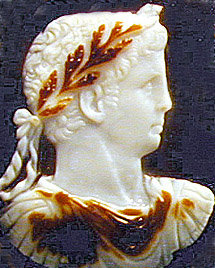
Drusus

Tiberius Claudius Drusus (10 BCE-54 CE), youngest son of Antonia the
Younger and Nero Claudius Drusus (the Elder), is better known as the
Emperor Claudius, grandson of Livia and Tiberius Claudius Nero. Brother of
the popular and successful Germanicus, who died while on assignment in
Syria as the heir to Tiberius, Claudius was born with a number of apparent
physical limitations (perhaps epilepsy as well), which caused the imperial
family great embarrassment and resulted in his being awarded no public
office by Augustus beyond that of augur. He spent most of his life in
seclusion, reading, writing, and under the supervision of a tutor well
beyond the time considered normal.
He is best remembered for the almost comical manner in which he became
emperor (41-54 CE) -- after the assassination of his nephew, the Emperor
Caligula, he was found hiding in the palace, and, while the Senate debated
the possibility of restoring the Republic, he was delared Emperor by the
Praetorian Guard. Despite his scholarly production and his liberal and
fairly stable rule, he was not widely respected and history has not been
kind to him: his writings have been lost (particularly unfortunate is the
loss of his work on the Etruscan language), and his rule is remembered
more for his bizarre behaviors, his preferment of freedmen, and his
indulgence of his wives, Messalina and Agrippina the Younger, the last of
whom may have poisoned him (see Tacitus, Annales,
books 11-12, and the cruelly satiric Apocolocyntosis,
attributed to Seneca).
Umbricius here makes reference to the somnolence of Claudius, whose ability to fall deeply asleep everywhere in public had become a widespread joke in his own lifetime (see Suetonius, Vita Divi Claudi, chapters 8 and 33.